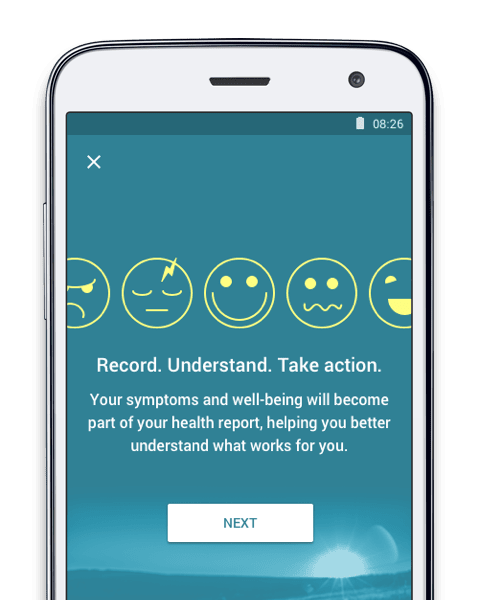Mental health concerns all of us: sooner or later everyone will come face to face with depression or anxiety – as a patient or a relative. In contrast to physical diseases such as diabetes or hypertension, a mental illness such as depression is often not socially accepted as a serious condition. Educating people about mental health and raising awareness can help to better understand and support patients suffering from depression or anxiety.
Depression, anxiety or phobias – each year, 1 out of 4 people in the UK have a mental health problem. Even when you only have a look at the statistics relevant to depression you will find that there are 3 million UK citizens diagnosed with this mental disorder, and that number is increasing. According to the WHO, depression will be the second-leading cause of world disability by 2020. Overcoming depression is not easy and requires the right treatment and support from family and friends.
But also the patients themselves can and should be proactive: with the help of the right apps, websites, and organizations, people with depression can get support during their therapy. With the support of Mind UK, Mental Health Foundation and other UK patient organizations we created an infographic that answers the most important questions and provides helpful tips: How do I track my mood? Can meditation help alleviate my symptoms? Where do I find help online?

What is depression?
Depression is a common mood disorder that can cause the persistent feeling of sadness, a lack of motivation and interest. Of course, everyone feels down from time to time. But when suffering from depression this feeling can take a hold of a person’s life, often being exasperated by the overwhelming thought of hopelessness and despair. In the UK, every tenth person will suffer from depression in his or her lifetime. Women are twice as likely as men to be affected and half of the people who have depression will experience a relapse.
What causes depression and what are the consequences?
Depression is a complex disease and can have different causes. Stressful life events, such as relationship problems, a family history of depression and personality traits are only a few of the factors that can lead to depression. Often it is a mix of several causes and can’t be traced back to one single reason.
People with depression often isolate themselves from friends and family. Some people even develop suicidal thoughts. Ca. 6000 people in the UK commit suicide every year – that’s one suicide every 90 minutes. Half of the people committing suicide suffer from major depression.
Because depression often occurs with physical symptoms such as aches and pains, people don’t recognize them as signs of a mental disease. Some people are afraid that their lack of motivation is a sign of weakness, others are at such a low that they don’t feel capable of visiting their GP. But the sooner you seek professional help the sooner you are on your way to recovery.
I have depression. Where can I find help?
The most important thing is to visit your GP. Together you can decide on the best treatment. But it’s also important to be proactive – there are a couple of things that you can do on top of your therapy:
Keep your body & mind fit
It’s proven that meditation and sports can help people with their mental health. A recent study showed that the mix of 30 minutes meditation and 30 minutes moderate exercise can alleviate your symptoms of depression and lift your mood. With the “headspace” app you can learn the basics of meditation and practice to get mindful in your daily life. The “Nike+ Run Club” app motivates you during your daily workout and tracks your progress to make sure you reach your fitness goals.
Take your meds & track your mood
Many people with depression do not take their antidepressants regularly. Especially when experiencing an acute depressive episode, people aren’t capable of taking their meds. But also bipolar disorder patients during an episode of feeling high struggle to take their pills as prescribed. However, to treat depression successfully it is important to stick to the prescribed therapy. The MyTherapy app (for android and iOS) reminds and motivates you to take your medications on time. The integrated mood tracker allows you to keep record of your well-being and symptoms. Studies with Europe’s largest university hospital Charité could already prove MyTherapy’s positive impact on medication intake: MyTherapy patients take their meds regularly and feel better.
Eat healthy & sleep well
Of course, nutrition alone can’t cure depression. But studies show that the right nutrition consisting of enough vegetables, fruits and fish and less cheese and meat can help alleviate the symptoms of depression.
Improving your sleeping habits is also an important factor: a regular bedtime ritual, as well as a relaxing atmosphere, can help you sleep better and find more rest during the evening. This not only makes you start your day relaxed but also helps reduce the symptoms of depression. Apps like “Runtastic Sleep Better” help you track your sleep cycles and document your sleeping quality.
Contact organisations & support groups
To make a full recovery it’s important to have the right understanding of depression. Organizations and support groups always lend an ear and can help you during your therapy. Well-known organizations in the UK are:
- Mind
- Mental Health Foundations
- Rethink Mental Illness
- Time to Change
- Young Minds
If you need help immediately, please call the Samaritans at 116 123 or SANE at 0300 304 700.
If you like this post, you may also like:


